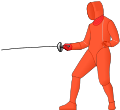

SPRINGFIELD FENCING CLUB
SPRINGFIELD
FENCING
CLUB
FENCING
CLUB



THE EPEE
The épée evolved from civilian weapons such as the 17th century small sword. The épée developed when authorities in the
19th century decided that they did not like the killing aspect of the duel and changed it to a "first blood" event. This required
much more skill, as a nick on the wrist or other exposed area could end the duel. Today’s épée fencing very much
resembles the 19th century dueling’s “first blood”.
THE EPEE
The épée evolved from civilian
weapons such as the 17th century
small sword. The épée developed
when authorities in the 19th century
decided that they did not like the
killing aspect of the duel and
changed it to a "first blood" event.
This required much more skill, as a
nick on the wrist or other exposed
area could end the duel. Today’s
épée fencing very
much resembles the
19th century dueling’s
“first blood”.
THE EPEE
The épée evolved from civilian weapons such as the 17th century small sword. The épée
developed when authorities in the 19th century decided that they did not
like the killing aspect of the duel and changed it to a "first blood" event.
This required much more skill, as a nick on the wrist or other exposed
area could end the duel. Today’s épée fencing very much resembles the
19th century dueling’s “first blood”.

THE SABER
The saber was originally a heavy curved sword used by cavalry soldiers. Over the centuries, the blade has become much
lighter and thinner and perfectly straight. The guard completely covers the hand. The target area for saber bouts is
anywhere above the waist (which is reminiscent of horseback days).
THE SABER
The saber was originally a heavy
curved sword used by cavalry
soldiers. Over the centuries, the
blade has become much lighter
and thinner and perfectly straight.
The guard completely covers the
hand. The target area for saber
bouts is anywhere
above the waist (which
is reminiscent of
horseback days).
THE SABER
The saber was originally a heavy curved sword used by cavalry soldiers.
Over the centuries, the blade has become much lighter and thinner and
perfectly straight. The guard completely covers the hand. The target area
for saber bouts is anywhere above the waist (which is reminiscent of
horseback days).

THE FOIL
The foil was invented in the middle of the 18th century as a training weapon in order to practice fast and elegant thrust
fencing. Fencers blunted the point by wrapping a foil around the blade or fastening a knob on the point. Another factor in the
target area is that foil rules are derived from a period when dueling to the death was the norm. Hence, the target area is the
torso, where the vital organs are.
THE FOIL
The foil was invented in the middle
of the 18th century as a training
weapon in order to practice fast
and elegant thrust fencing.
Fencers blunted the point by
wrapping a foil around the blade or
fastening a knob on the point.
Another factor in the target area is
that foil rules are derived from a
period when dueling to the death
was the norm. Hence, the target
area is the torso,
where the vital
organs are.
THE FOIL
The foil was invented in the middle of the 18th century as a training weapon in order to
practice fast and elegant thrust fencing. Fencers blunted the point by
wrapping a foil around the blade or fastening a knob on the point. Another
factor in the target area is that foil rules are derived from a period when
dueling to the death was the norm. Hence, the target area is the torso,
where the vital organs are.




















